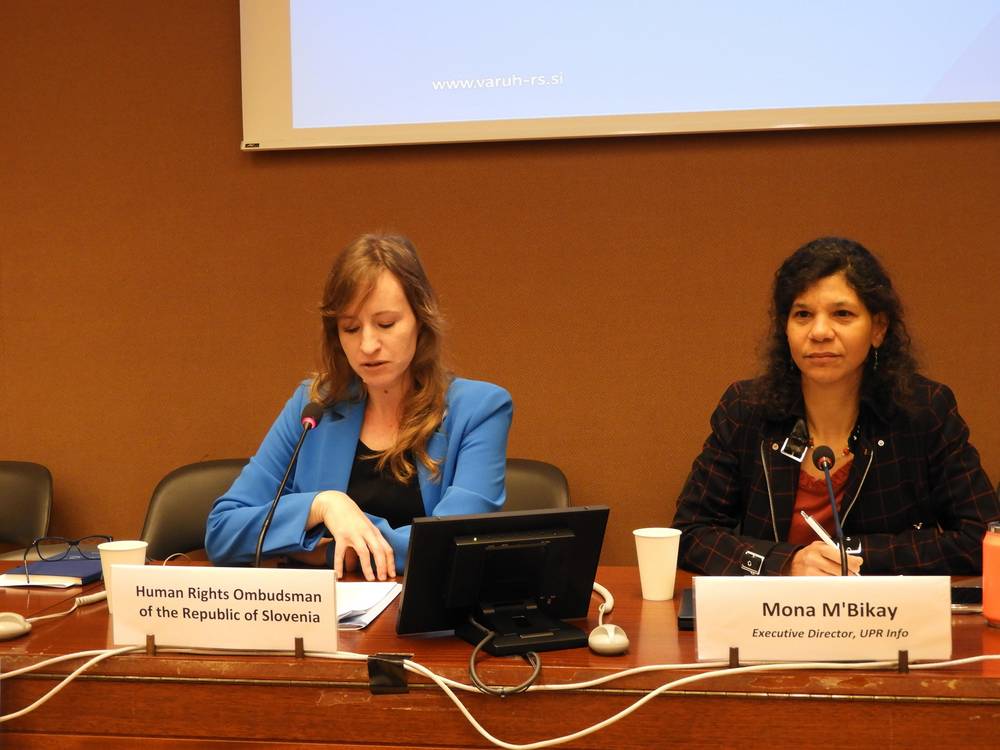The Slovenian Human Rights Ombudsman participated in the pre-session of the Universal Periodic Review (UPR) on 22 November 2024 in Geneva. This preparatory meeting takes place ahead of the main UPR session, during which Slovenia will report to other countries on its progress in the field of human rights, while receiving recommendations for improvements.
Jerneja Turin, Advisor at the Centre for Human Rights, presented key human rights areas requiring special attention in Slovenia to representatives of permanent missions in Geneva. Particular emphasis was placed on the right to health and the protection of vulnerable groups, such as women, persons with disabilities, the elderly, and the Roma community.
Health and Access to Care
Persistent challenges in Slovenia’s healthcare system continue to undermine the right to health. A severe shortage of healthcare professionals, including doctors, nurses, and specialists, has led to significant barriers to accessing essential services. These shortages disproportionately affect older persons, women, individuals with limited digital skills, and those seeking specialized care such as gynaecology, pediatrics, and mental health services. Long waiting times for consultations, surgeries, and urgent care, alongside the lack of reliable public data on waiting periods, reflect systemic inefficiencies.
Children are particularly affected by these systemic gaps. Slovenia lacks sufficient child psychiatrists, psychologists, and forensic experts, resulting in prolonged delays in accessing critical mental health and legal support services. These shortcomings hinder the ability to provide timely and effective care, further exacerbating vulnerabilities among children in need.
Targeted reforms are urgently required to effectively address workforce shortages, modernize healthcare systems, and ensure timely access to comprehensive care for all.
Persons with Disabilities
The rights of persons with disabilities remain inadequately protected. Public facilities, including schools and administrative buildings, often fail to meet accessibility standards. Institutional care continues to dominate over community-based alternatives, restricting independent living and exposing persons with disabilities to the risks of violence, neglect, and inadequate treatment.
Serious concerns also persist in secure wards of psychiatric hospitals and social care institutions, where overcrowding and inadequate care environments lead to violations of residents’ rights. The Ombudsman has called for robust oversight, improved care quality, and measures to reduce premature institutionalization.
Additionally, the Ombudsman has expressed grave concern about incidents of violence and abuse reported at the Psychiatric Clinic of the University of Ljubljana.
Legal inconsistencies, including the lack of a unified definition of disability across legislation, hinder the realization of rights. The Ombudsman calls for alignment of national laws with the Convention on the Rights of Persons with Disabilities, the establishment of a unified disability assessment body, and expansion of inclusive community-based care services.
Older Persons
Older persons face significant challenges, particularly due to Slovenia's overreliance on institutional care. Staff shortages in care homes, coupled with rising reports of abuse, underscore the urgent need for reforms. Improving workforce conditions and investing in community-based care alternatives are essential to safeguarding the dignity and rights of older persons. Targeted measures, such as enhanced staff training and the establishment of robust monitoring systems, are crucial to preventing abuse and ensuring accountability. Additionally, mechanisms should be developed to amplify the voices of older persons in decision-making processes, ensuring their perspectives and needs are fully considered.
Roma
Social exclusion of Roma persists, particularly in southeastern regions. Many live in segregated settlements, some lacking basic services such as safe drinking water, sanitation, and electricity. Educational outcomes remain alarmingly low. A 2022 Institute for Ethnic Studies report found that only 21.3% of Roma pupils completed all nine grades of primary school, with the southeastern region averaging just 12.3%. Health disparities are also pronounced, with life expectancy and child mortality rates significantly worse than the national average. The Ombudsman calls for comprehensive measures to secure adequate housing, improve education access, and address health disparities. Eliminating the distinction between "autochthonous" and "non-autochthonous" Roma is also essential to ensuring equal rights and representation.
Women
Gender-based violence remains a critical issue in Slovenia, with data showing that a significant proportion of women have experienced physical, sexual, or psychological violence. Many incidents go unreported, underscoring systemic gaps in prevention, support services, and access to justice. The Ombudsman highlights the need for reliable data to inform effective policies and urges attention to violence affecting vulnerable groups, including children, older persons, persons with disabilities, migrants, and those in Roma communities. Efforts to prevent gender-based violence must be strengthened. Furthermore, Slovenia lacks a dedicated crisis referral centre for victims of rape and sexual violence. Such a centre, providing medical, forensic, and trauma support, is needed to fulfil obligations under the Istanbul Convention.
In addition to the issues already mentioned, Slovenia faces further challenges regarding hate speech, environmental protection, prison overcrowding, the rights of migrants and asylum seekers, the rights of LGBTIQ+ persons, the Erased, the rights of children, and victims of human trafficking. The Ombudsman also expressed concern about the frequent use of urgent legislative procedures with limited public consultation and the absence of a comprehensive strategy to combat discrimination, including the fragmentation of data across protected categories.
For the Pre-Session, the Ombudsman also prepared a brief report containing more detailed information and specific recommendations for improving the state of human rights in Slovenia.
See: NHRI report for the 4th cycle of the Universal Periodic Review of Slovenia

![[Translate to English:] Jerneja Turin an preseji UPR-ja](/fileadmin/_processed_/c/0/csm_DSCN6832_e8fc3e46c9.jpg)